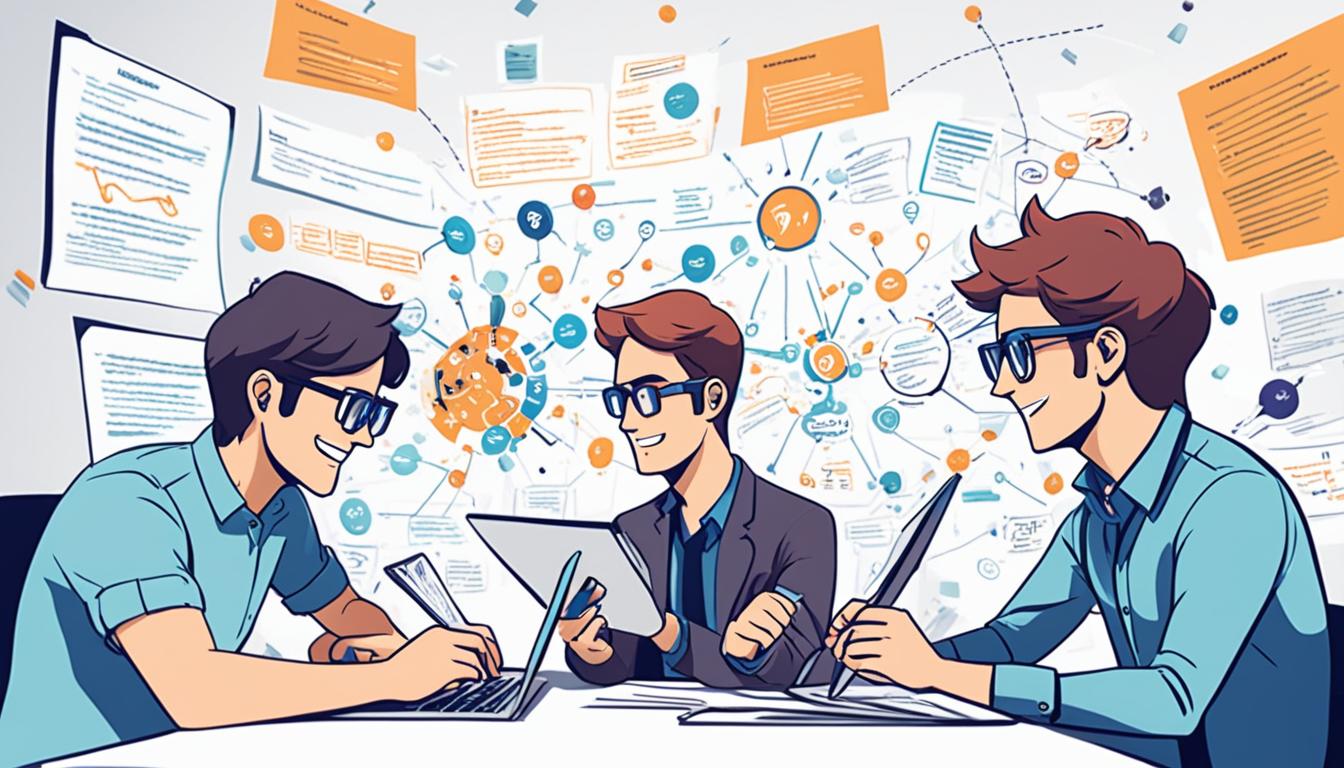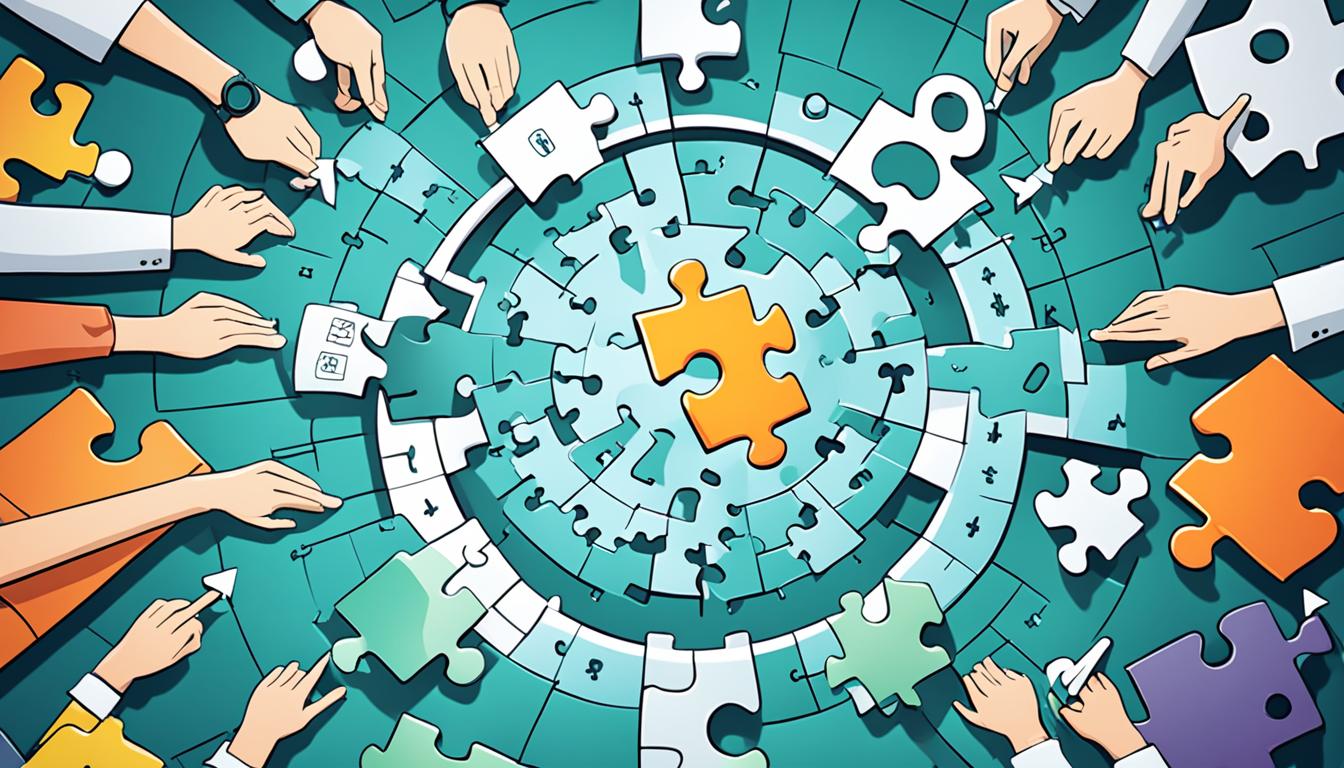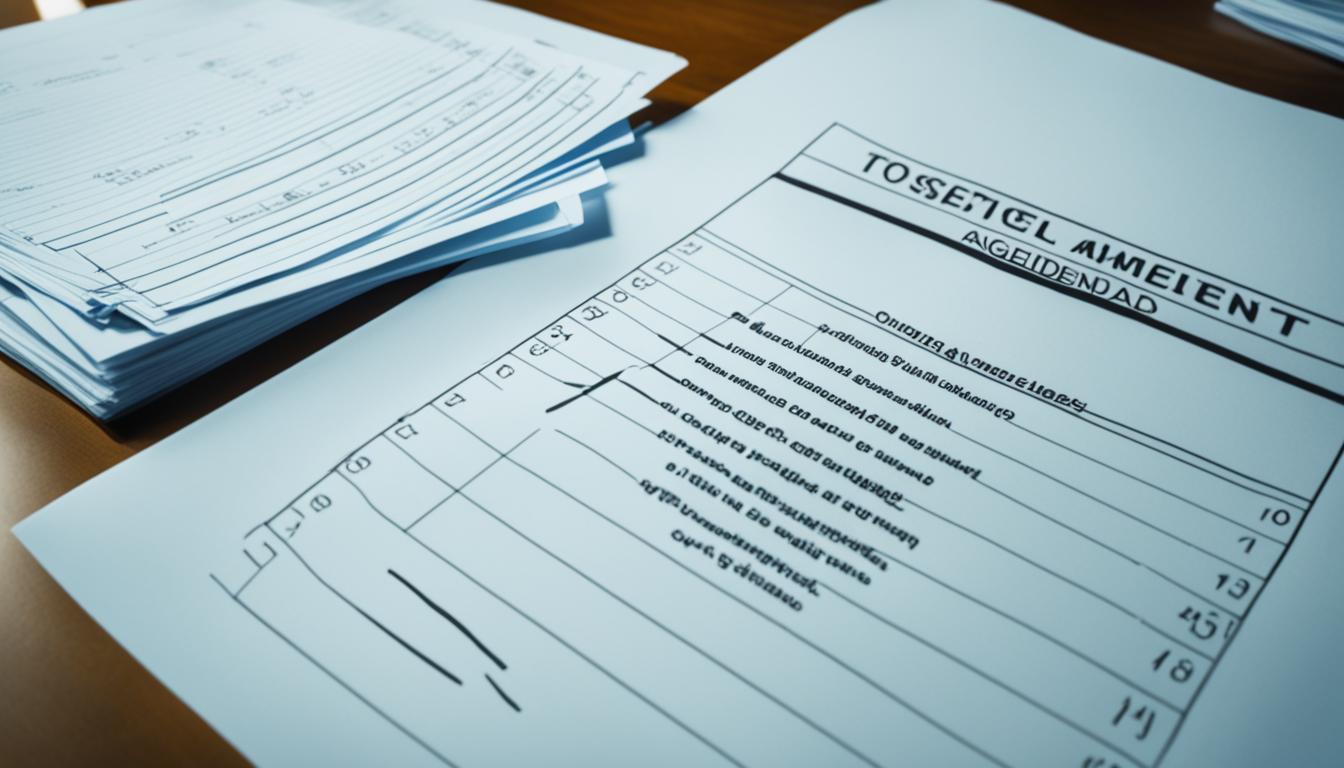
“The Efficient Meeting Planner: Strategies for Time-Saving and Effectiveness””

“The key is not to prioritize what’s on your schedule, but to schedule your priorities.” – Stephen Covey
Welcome to the world of meeting planning, where efficiency and effectiveness are paramount to achieving successful outcomes. As an event planner, your ability to save time and streamline processes can significantly impact the overall productivity of your meetings. In this article, we will explore strategies and tips that will help you become an efficient meeting planner, enabling you to optimize your time and maximize the effectiveness of your meetings.
Key Takeaways:
- Implement time-saving strategies to enhance meeting planning efficiency.
- Set clear goals and objectives to prioritize tasks and minimize time wastage.
- Plan ahead and allocate time for unforeseen circumstances.
- Effectively delegate tasks to leverage the strengths of your team.
- Minimize distractions and maintain focus for optimized meeting planning.
Importance of Time Management for Event Planners
Time management is crucial for event planners to maintain productivity and ensure the success of their meetings. Effective time management skills can lead to increased efficiency, reduced stress, and improved outcomes. It is essential for event planners to prioritize their goals, plan ahead, delegate tasks, minimize distractions, and make time for self-care.
Properly managing your time as an event planner is essential to ensure smooth and successful meetings. By efficiently allocating your time, you can achieve your goals, meet deadlines, and maintain a high level of productivity. Time management skills not only benefit you but also contribute to effective meeting organization, resulting in improved outcomes and a positive experience for all participants.
Event planners juggle multiple responsibilities and tasks, such as coordinating logistics, communicating with vendors and stakeholders, creating agendas, and ensuring everything runs smoothly during the event itself. Without effective time management, it becomes challenging to handle these responsibilities simultaneously, leading to delays, stress, and potential errors.
“Time is the scarcest resource, and unless it is managed, nothing else can be managed.” – Peter Drucker
By implementing time management strategies, event planners can optimize their productivity and achieve their goals without feeling overwhelmed. Here are some key benefits of effective time management:
- Increased efficiency: Properly managing your time allows you to prioritize essential tasks and allocate resources accordingly. By focusing on high-priority activities, you can minimize time wastage and accomplish more in less time.
- Reduced stress: Time management helps alleviate stress by providing a clear structure and plan for completing tasks. Knowing what needs to be done and having a schedule to follow reduces last-minute rushes and allows for smoother workflow.
- Improved outcomes: When event planners effectively manage their time, they can devote sufficient attention to each aspect of the event planning process. This attention to detail leads to better decision-making, coordination, and ultimately, improved outcomes.
Effective time management comprises various strategies and techniques that event planners can implement to enhance their productivity and meeting effectiveness. Let’s explore some essential time management techniques for event planners:
- Setting clear goals: Clearly defining your objectives and goals helps you prioritize tasks and allocate your time accordingly. By having a clear vision of what you want to achieve, you can make more informed decisions about how to spend your time.
- Planning ahead: Creating a detailed schedule in advance allows you to anticipate and allocate sufficient time for each task. This proactive approach helps prevent last-minute rushes and ensures that all necessary steps are completed timely.
- Delegating tasks: Recognizing when it is appropriate to delegate tasks and leveraging the skills of your team members can save valuable time and allow you to focus on critical responsibilities. Proper delegation also fosters teamwork and empowers your team members.
- Minimizing distractions: Identify potential distractions and take proactive steps to minimize their impact. This may include establishing boundaries, limiting access to non-essential apps or websites during work hours, and creating a conducive work environment.
- Making time for self-care: Prioritizing self-care activities, such as exercise, relaxation, and hobbies, is essential for maintaining mental and physical well-being. Taking breaks and making time for yourself rejuvenates your energy and enhances productivity.
Tips for Setting Goals in Event Planning
Setting clear goals before each event is a key aspect of efficient meeting planning. As an event planner, it is essential to identify your desired outcomes and plan activities that align with those goals. By focusing on specific objectives, you can prioritize your tasks, minimize time wastage, and increase the effectiveness of your meetings.
When setting goals in event planning, it is crucial to consider the overall purpose of the meeting and the desired outcomes. Ask yourself:
- What are the main objectives of this particular event?
- What do you hope to achieve through this meeting?
- How can you ensure that the goals are measurable and attainable?
To effectively set goals in event planning, follow these tips:
- Be specific: Clearly define what you want to accomplish. Avoid vague or generic goals. Instead, be specific and detailed in your objectives.
- Align with event objectives: Ensure that your goals align with the overall objectives of the event. This will help you stay focused and ensure that every activity contributes to the success of the meeting.
- Make them measurable: Set goals that can be measured and evaluated. This will allow you to assess your progress and determine if you’re on track to achieve the desired outcomes.
- Set realistic targets: While it is essential to challenge yourself, it’s also crucial to set realistic goals. Consider the resources and time available to you, and set targets that are achievable within those limitations.
- Break them down: If your goals are complex or overwhelming, break them down into smaller, manageable milestones. This will make it easier to track progress and stay motivated.
By setting clear and specific goals in event planning, you can streamline your efforts, stay focused, and ensure that each task contributes to the overall success of your meetings. Remember, effective goal setting is the foundation for efficient meeting management.
Setting goals is the first step in turning the invisible into the visible. – Tony Robbins
| Benefits of Goal Setting in Event Planning | Examples |
|---|---|
| Clear direction and focus | Setting a goal to increase attendee engagement by 20% through interactive sessions |
| Improved decision making | Setting a goal to evaluate potential event venues based on cost, location, and amenities |
| Increased motivation and accountability | Setting a goal to secure sponsorship from at least three major companies |
| Enhanced resource allocation | Setting a goal to optimize budget allocation for marketing and promotional activities |
| Measurable success and evaluation | Setting a goal to achieve a Net Promoter Score of 9 or higher from attendee surveys |
The Benefits of Planning Ahead in Meeting Preparation
Planning ahead is a fundamental aspect of effective meeting management. By prioritizing task allocation and allocating time for unforeseen circumstances, event planners can streamline the meeting preparation process and optimize productivity. Planning ahead allows you to:
Reduce Stress
When you plan ahead, you eliminate the last-minute rush and the anxiety that accompanies it. By having a clear idea of the tasks that need to be completed each day, you can allocate sufficient time and resources, minimizing the pressure and ensuring a smoother meeting preparation process.
Improve Productivity
Planning ahead enables you to stay organized and focused. By breaking down the meeting preparation process into smaller, manageable tasks, you can set deadlines and create a structured timeline. This approach promotes efficient task completion, increases productivity, and fosters a sense of accomplishment.
Ensure Task Prioritization
When you plan ahead, you can prioritize tasks based on their importance and urgency. This allows you to focus on essential aspects of meeting preparation, ensuring that critical tasks are addressed first. By prioritizing tasks effectively, you can maximize the impact of your efforts and ensure that all crucial aspects are given due attention.
“Planning is bringing the future into the present so that you can do something about it now.” – Alan Lakein
By following a well-defined plan, you establish a clear roadmap to guide your meeting preparation efforts. With a structured approach in place, you can allocate time and resources strategically, ensuring that all essential tasks are accomplished within the designated timeframe.
As you embark on meeting preparation, remember the importance of planning ahead. By reducing stress, improving productivity, and ensuring task prioritization, you set yourself up for success. Embrace the power of planning and experience the benefits it brings to your meeting management process.
The Power of Delegating Tasks in Event Planning
Delegating tasks is a vital skill for event planners. By understanding the skills and expertise of your team members, you can distribute tasks effectively, saving your own time and developing leadership skills in the process. Effective delegation allows event organizers to leverage the strengths of their team and accomplish more in less time.
When it comes to task delegation, it’s important to consider the strengths and weaknesses of each team member. This enables you to assign tasks that align with their abilities and expertise. By doing so, you not only ensure that the tasks are completed efficiently, but you also empower your team to take ownership of their work and develop their skills further.
Delegating tasks also allows event planners to focus on strategic decision-making and high-level responsibilities. By freeing up your time from routine or less critical tasks, you can devote more attention to the overall event planning process, ensuring the success of the event.
Furthermore, delegation fosters a sense of trust and collaboration within your team. When you delegate tasks to your team members, you show that you have confidence in their abilities, which strengthens their commitment to the project and encourages them to take greater initiative in their work.
Effective delegation is not about just “dumping” tasks onto others. It’s about assigning tasks strategically, based on individual strengths and priorities, to create a cohesive and efficient team.
Additionally, task delegation provides valuable learning opportunities for your team members. By entrusting them with new responsibilities, you allow them to expand their skill set and gain valuable experience in event planning. This not only benefits your team members individually but also strengthens your team as a whole.
To effectively delegate tasks, use clear communication and provide detailed instructions and expectations. Regularly check-in with your team members to ensure that they have the necessary resources and support to complete their assigned tasks successfully.
By mastering the art of task delegation, event planners can optimize their time and resources, enhance team collaboration, and ultimately create successful and memorable events.
Minimizing Distractions for Efficient Meeting Planning
When it comes to efficient meeting planning, minimizing distractions is key. Distractions can significantly derail your focus, waste valuable time, and hinder the success of your meetings. To optimize your time management and task focus, it’s essential to identify and eliminate any activities or habits that may impede your productivity.
Here are some strategies to minimize distractions and ensure efficient meeting planning:
- Prioritize your tasks: Identify the most important tasks that need to be accomplished for successful meeting preparation. Prioritizing your tasks helps you stay focused on what truly matters and avoid getting caught up in less important activities.
- Create a distraction-free environment: Find a quiet and dedicated space where you can work without interruptions. Let your colleagues and team members know that you need uninterrupted time to focus on meeting planning tasks.
- Turn off notifications: Disable unnecessary email, chat, or social media notifications that could distract you from your work. Schedule specific times throughout the day to check and respond to messages, rather than allowing them to constantly interrupt your workflow.
- Establish clear boundaries: Communicate with your coworkers and set boundaries to minimize disruptions during designated work hours. Let them know that unless it’s an emergency or directly related to meeting planning, you should not be disturbed.
- Utilize time-blocking techniques: Allocate specific blocks of time for different tasks and activities. By dedicating focused periods for meeting planning, you can better manage your time and ensure that distractions are minimized during these dedicated time slots.
“The greatest weapon against distractions is a clear and well-defined focus on your goals and priorities.” – [Author Name]
Remember, minimizing distractions requires discipline and conscious effort. Stay committed to maintaining a distraction-free environment and consistently practice effective time management techniques. By doing so, you’ll maximize your productivity, increase efficiency, and ensure the success of your meetings.
Minimizing Distractions Checklist
| Strategies | Implementation |
|---|---|
| Prioritize tasks | Identify and rank tasks based on importance |
| Create a distraction-free environment | Find a quiet space free from interruptions |
| Turn off notifications | Disable email, chat, and social media notifications |
| Establish clear boundaries | Communicate availability and set expectations with colleagues |
| Utilize time-blocking techniques | Allocate dedicated time for specific tasks |

The Importance of Self-Care for Event Planners
Event planners often work long hours and can easily neglect their own well-being. Incorporating self-care practices into your routine, such as taking breaks, engaging in physical activity, or pursuing hobbies, is essential for maintaining productivity and preventing burnout. By balancing work and personal life, you can maximize your efficiency and effectiveness in meeting planning.
When you prioritize self-care, you invest in your own well-being, allowing you to have the energy and focus needed to excel in your role. Here are some self-care practices that can help you maintain a healthy work-life balance and manage your time effectively:
- Take regular breaks: It’s important to give yourself short breaks throughout the day to recharge. Step away from your desk, go for a walk, or practice deep breathing exercises to clear your mind and reduce stress.
- Engage in physical activity: Incorporate exercise into your routine to boost your energy levels and improve your overall well-being. Whether it’s going for a run, taking a yoga class, or doing a home workout, find an activity that you enjoy and make it a priority.
- Pursue hobbies: Make time for activities that bring you joy and help you relax. Whether it’s reading, painting, playing a musical instrument, or gardening, engaging in hobbies can provide a much-needed mental break and rejuvenate your creativity.
- Practice mindfulness: Set aside time each day for mindfulness exercises such as meditation or journaling. These practices can help you cultivate self-awareness, reduce stress, and enhance your overall well-being.
Remember, self-care is not selfish. It is essential for maintaining a healthy work-life balance, avoiding burnout, and ultimately, being more effective in your role as an event planner.
By prioritizing self-care, you can recharge your batteries and approach your work with renewed focus and creativity. Incorporate these self-care practices into your routine to ensure that you can continue to deliver exceptional results while maintaining your own well-being.
The Art of Saying No in Event Planning
As an event planner, it is crucial that you prioritize your time and focus on tasks that contribute to the success of your meetings. This requires effective task prioritization and time management. One important aspect of time management is the ability to say no to tasks or commitments that do not align with your priorities.
By learning to say no when necessary, you can create boundaries and allocate your time and energy to the most important tasks. Saying no allows you to avoid overcommitting yourself and spreading yourself too thin. It empowers you to stay focused on the tasks that truly matter in meeting planning.
When you say no, it is essential to do so respectfully and tactfully. Clearly communicate your priorities and explain why you are unable to take on additional tasks or commitments. This helps others understand your perspective and enables them to find alternative solutions or resources.
Saying no can be challenging, especially if you are a people-pleaser or fear disappointing others. However, it is important to remember that by saying no, you are not only protecting your time and energy, but also ensuring that you can fully dedicate yourself to the tasks that will contribute to the success of your meetings.
The Benefits of Saying No:
- Task Prioritization: By saying no, you can prioritize important tasks and avoid taking on unnecessary or low-priority commitments.
- Time Management: Saying no helps you manage your time effectively by allocating it to the tasks that align with your goals and objectives.
- Reduced Stress: By setting boundaries and saying no when necessary, you can reduce stress and prevent overwhelm.
Remember, saying no is not a sign of weakness or incompetence. It is a powerful tool for effective time management and task prioritization. Don’t be afraid to use it to your advantage.
| Key Points | Benefits |
|---|---|
| Task Prioritization | Allows you to focus on important tasks |
| Time Management | Enables you to allocate time to high-priority tasks |
| Reduced Stress | Prevents overwhelm and promotes work-life balance |
By mastering the art of saying no, you can enhance your task prioritization and time management skills, ultimately leading to more successful and efficient meeting planning. Remember, your time and energy are valuable resources, and it is essential to protect them and invest them wisely in achieving your meeting objectives.
The Common Purposes of Meetings
Meetings play a vital role in event planning, serving various purposes that contribute to the success of an event. Understanding these purposes allows event planners to structure their agendas and manage their time effectively, ensuring productive and efficient meetings.
Supervision and Performance Management
In event planning, meetings serve as a platform for supervisors to provide guidance, support, and feedback to their team members. These supervision meetings allow for performance management, where supervisors assess progress, set goals, and identify areas for improvement. By conducting regular supervision meetings, event planners can enhance the professional development and productivity of their team.
Communication
Effective communication is essential in event planning, and meetings provide a valuable opportunity for team members to exchange information, ideas, and updates. Whether it’s discussing event logistics, sharing project updates, or addressing challenges, meetings foster collaboration and ensure everyone is on the same page. Clear and open communication is crucial for successful event execution.
“Meetings provide a platform for team members to communicate, exchange ideas, and collaborate effectively.”
Problem Solving
Events often present unexpected challenges that require prompt solutions. Meetings provide a space for event planners to identify and address these issues, brainstorm ideas, and develop effective strategies. By bringing together diverse perspectives and expertise, meetings facilitate problem-solving, ensuring that events run smoothly and successfully.
Project Management
Events involve various tasks, deadlines, and deliverables, requiring effective project management. Meetings allow event planners to discuss project milestones, allocate resources, and track progress. By closely monitoring project management during meetings, event planners can ensure that tasks are completed on time, budgets are adhered to, and the event is executed flawlessly.
By recognizing the different purposes of meetings in event planning, event planners can tailor their approach and planning strategies accordingly. Whether it’s supervision and performance management, communication, problem-solving, or project management, each meeting type requires careful consideration and efficient coordination to achieve successful outcomes. With a well-structured agenda and effective time management, event planners can maximize the impact of their meetings and drive event success.
Strategies for Effective Supervision Meetings
Supervision meetings play a crucial role in the professional development of event planners. The ability of supervisors to set clear performance expectations, monitor progress, and provide feedback is instrumental in shaping the skills and capabilities of their supervisees. To ensure productive and meaningful supervision meetings, effective planning and agenda setting are essential.
When planning supervision meetings, it is important to establish a clear agenda that outlines the topics to be discussed. This allows both the supervisor and the supervisee to come prepared and make the most of their time together. The agenda should be structured in a logical order, focusing on key areas such as performance updates, goal setting, and professional development opportunities.
During the meeting, the supervisor should provide constructive feedback on the supervisee’s performance, highlighting areas of strength and areas for improvement. This feedback should be specific, actionable, and delivered in a supportive manner. By addressing performance-related issues and offering guidance, supervisors can help event planners enhance their skills and achieve their fullest potential.
Key Strategies for Effective Supervision Meetings:
- Establish clear performance expectations and communicate them to the supervisee.
- Monitor progress regularly and provide timely feedback.
- Set aside dedicated time for goal setting and discussing professional development opportunities.
- Encourage open communication and active participation from both the supervisor and the supervisee.
- Document action plans and follow up on agreed-upon tasks.
Effective supervision meetings not only contribute to the growth and development of event planners but also foster a strong working relationship between supervisors and supervisees. By implementing these strategies, event planners can maximize the benefits of supervision meetings and enhance their overall performance in the field of event planning.
Note: The image above illustrates the collaborative nature of supervision meetings and the importance of effective communication and feedback.
Conclusion
Implementing time-saving strategies and effective management techniques is essential for efficient meeting planning. By setting clear goals and planning ahead, event planners can streamline their preparation process and maximize productivity. Delegating tasks and minimizing distractions further contribute to an optimized workflow, allowing event planners to focus on crucial aspects of meeting coordination. By also prioritizing self-care and important tasks, event planners can strike a balance between work and personal life, ensuring sustained effectiveness in meeting planning.
In conclusion, by following these time-saving strategies and effective meeting planning techniques, event planners can enhance their efficiency and achieve successful outcomes. With streamlined processes, increased productivity, and optimized preparation, events can be executed smoothly and with maximum effectiveness. By incorporating these strategies into their workflow, event planners can save time, reduce stress, and deliver exceptional results.






























